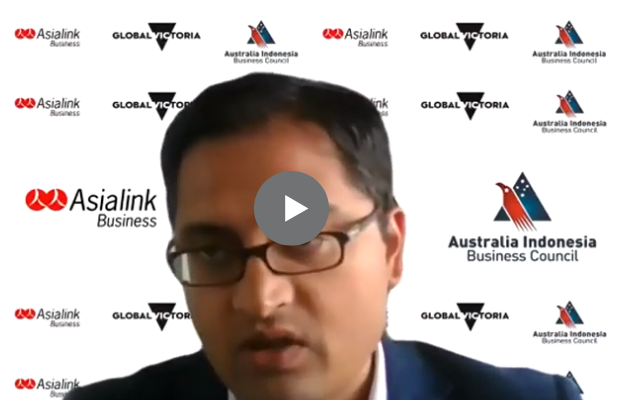IA-CEPA: a golden opportunity for Victorian business
4 August 2020: The new Indonesia-Australia Comprehensive Economic Partnership Agreement (IA-CEPA) presents a golden opportunity for Victorian businesses in one of Asia’s biggest emerging growth markets.
Asialink Business in partnership with Global Victoria and the Australia Indonesia Business Council explored IA-CEPA and what it means for business during an online event.
The webinar was moderated by Asialink Business CEO Mukund Narayanamurti and featured a distinguished panel of speakers that included:
- Leigh Howard: Acting Commissioner to Southeast Asia, State Government of Victoria
- Spica Alphanya Tutuhatunewa: Consulate-General of the Republic of Indonesia (Victoria)
- Michael Dean: Regional Trade Agreements Division, Department of Foreign Affairs and Trade
- Garry Embleton: Operations Director, Ausfine Foods and Victorian Deputy Chair, Australia Indonesia Business Council
The Indonesian economy is forecast to become the world’s fourth largest by 2025 and Victoria represents a significant gateway to a rising middle-class market of 263 million.
Leigh Howard shared how Victoria already had a growing trade relationship with Indonesia and that it represented the state’s eighth largest trading partner overall. Victoria’s top three export products to Indonesia are frozen meat, milk and cream and fresh or dried grapes, while Indonesia’s top three exports to Australia are cigarettes, petroleum oils and fertilisers.
Mr Howard said IA-CEPA – which came into force on 5 July – presented new opportunities in a range of areas, including food, education, e-commerce and economic cooperation more generally.
The agreement provides due recognition to the importance of vocational education in the relationship, with Australian providers for example allowed to take ownership stakes of up to 67 per cent in Indonesia’s vocational training and education sector. Guaranteed levels of Australian ownership will also be permitted across various other areas, including hospitals.
IA-CEPA also allows for the electronic lodgement of trade documentation and strengthens data and IP protection by removing the requirement for data to be stored in local servers in Indonesia and for software source codes to be shared as a condition of registration.
And while free trade agreements place emphasis on the liberalisation of tariffs, quotas and regulations, IA-CEPA also tracks a sensible pathway for future market access gains as the relationship evolves.
Consul General Spica Tutuhatunewa noted that Victoria and Indonesia have had a long-standing relationship and enjoyed strong cultural ties in addition to economic relations. There are for example around 7,000 Indonesian students studying in Victoria, while opportunities in education and training would only grow given Indonesia’s relatively young population, of which 60 per cent are of productive age.
Ms Tutuhatunewa identified education, energy, healthcare, agribusiness, transportation and telecommunications as key opportunities in Indonesia for Victorian businesses.
The importance of Indonesia’s digital economy was emphasised as an area of enormous opportunity. Indonesia has 170 million internet users who are increasingly using e-commerce platforms to source a very diverse range of products and services.
Michael Dean said that given the prospects, Australia’s trade and investment relationship with Indonesia could certainly be stronger underlined by the fact that Indonesia is only Australia’s 13th biggest trading partner overall, with Indonesia 27th in terms of Australian outbound investment.
Under I-A CEPA 99 per cent of Australia’s good exports will enter Indonesia duty free or with improved preferential arrangements with major benefits for exports such as frozen beef, sugar and vegetables. Indonesia will also issue import permits automatically and without seasonality restrictions for certain Australian exports.
For prospective exporters, it is however important to know that preferential tariff outcomes from free trade agreements (FTAs) do not occur automatically. Exporters need to satisfy rules-of-origin requirements and lodge relevant documentation. This is to ensure that only genuine products from Australia or Indonesia benefit from IA-CEPA.
For exports to Indonesia, authorising bodies for certificates of origin, include The Australian Chamber of Commerce and Industry, The Australian Industry Group and Ozdocs International.
DFAT operates a comprehensive and user-friendly Free Trade Agreement Portal which provides important information about utilising Australia’s 14 FTAs.
Garry Embleton said Ausfine established an office in Jakarta in 2014 and took the decision to diversify into Indonesia at a time when some other exporters were looking to put “all their eggs in the China basket”. The company specialises in meat and dairy exports and while these were already an important export for Victoria there was scope for growth in Indonesia.
Mr Embleton said while Australia, by global standards, was a relatively small exporter to Indonesia in terms of trade volume, the average value of our exports was higher compared to the likes of the US and EU and IA-CEPA would help further increase the average value.
Given the growth prospects in Indonesia he encouraged exporters to turn their attention to Indonesia when considering new market opportunities.
Watch the full event recording here:

